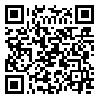Volume 81, Issue 9 (December 2023)
Tehran Univ Med J 2023, 81(9): 666-675 |
Back to browse issues page
Download citation:
BibTeX | RIS | EndNote | Medlars | ProCite | Reference Manager | RefWorks
Send citation to:



BibTeX | RIS | EndNote | Medlars | ProCite | Reference Manager | RefWorks
Send citation to:
Afra A, Nafari P, Foroutan M, Momtazan M, Kamyari N. Determining the relationship between evidence-based medicine with academic self-efficacy and research self-efficacy in medical students. Tehran Univ Med J 2023; 81 (9) :666-675
URL: http://tumj.tums.ac.ir/article-1-12799-en.html
URL: http://tumj.tums.ac.ir/article-1-12799-en.html
1- Department of Nursing, School of Nursing, Abadan University of Medical Sciences, Abadan, Iran.
2- Student Research Committee, Faculty of Medicine, Abadan University of Medical Sciences, Abadan, Iran.
3- Department of Basic Medical Sciences, Faculty of Medicine, Abadan University of Medical Sciences, Abadan, Iran.
4- Department of Library and Medical Information, School of Allied Medical Sciences, Abadan University of Medical Sciences, Abadan, Iran.
5- Department of Public Health, School of Health, Abadan University of Medical Sciences, Abadan, Iran.
2- Student Research Committee, Faculty of Medicine, Abadan University of Medical Sciences, Abadan, Iran.
3- Department of Basic Medical Sciences, Faculty of Medicine, Abadan University of Medical Sciences, Abadan, Iran.
4- Department of Library and Medical Information, School of Allied Medical Sciences, Abadan University of Medical Sciences, Abadan, Iran.
5- Department of Public Health, School of Health, Abadan University of Medical Sciences, Abadan, Iran.
Abstract: (125 Views)
Background: Correct clinical decision-making has a significant impact on the treatment process, achieving the expected clinical outcome and increasing patient satisfaction, and identifying the factors affecting it is essential for evidence-based medical education. This study aimed to determine the relationship between evidence-based medicine with academic self-efficacy and research self-efficacy of medical students.
Methods: This descriptive analytical study conducted from October 2022 to October 2023 on 45 medical students at Abadan University of Medical Sciences. After obtaining consent from the students and registering demographic and educational information, data collection was performed using evidence-based medicine, academic self-efficacy, and research self-efficacy questionnaires. Then data analyzed by descriptive statistics, Pearson correlation coefficient, Spearman correlation coefficient, and regression model in SPSS.
Methods: This descriptive analytical study conducted from October 2022 to October 2023 on 45 medical students at Abadan University of Medical Sciences. After obtaining consent from the students and registering demographic and educational information, data collection was performed using evidence-based medicine, academic self-efficacy, and research self-efficacy questionnaires. Then data analyzed by descriptive statistics, Pearson correlation coefficient, Spearman correlation coefficient, and regression model in SPSS.
|
Results: The findings of our study showed that research self-efficacy in students who had research experience (189.03) was significantly higher than students who did not have research experience (140.76). In addition, the average score of academic and research self-efficacy and evidence-based medicine in students who had a history of membership in the student research committee was significantly higher than students who did not have a history of membership. Finally, it was found that evidence-based medicine had a direct and significant relationship with research self-efficacy (r=0.361, P<0.05) and academic self-efficacy (r=0.457, P<0.001). In examining the relationship between academic self-efficacy and research self-efficacy, it was also found that these two variables have a direct and significant relationship with each other (r=0.714, P<0.001). As well as, there was no significant relationship between academic self-efficacy, research self-efficacy, and understanding the characteristics of evidence-based practice with any of the variables of age, gender and entry year (P>0.05).
Conclusion: According to the obtained results, it can be concluded that academic self-efficacy and research self-efficacy have an effect on evidence-based medicine, and all of the above can be improved by teaching medical students to participate in student research committees and doing research work. In this way, it improves the quality of treatment in doctors. |
Type of Study: Original Article |
| Rights and permissions | |
 |
This work is licensed under a Creative Commons Attribution-NonCommercial 4.0 International License. |





